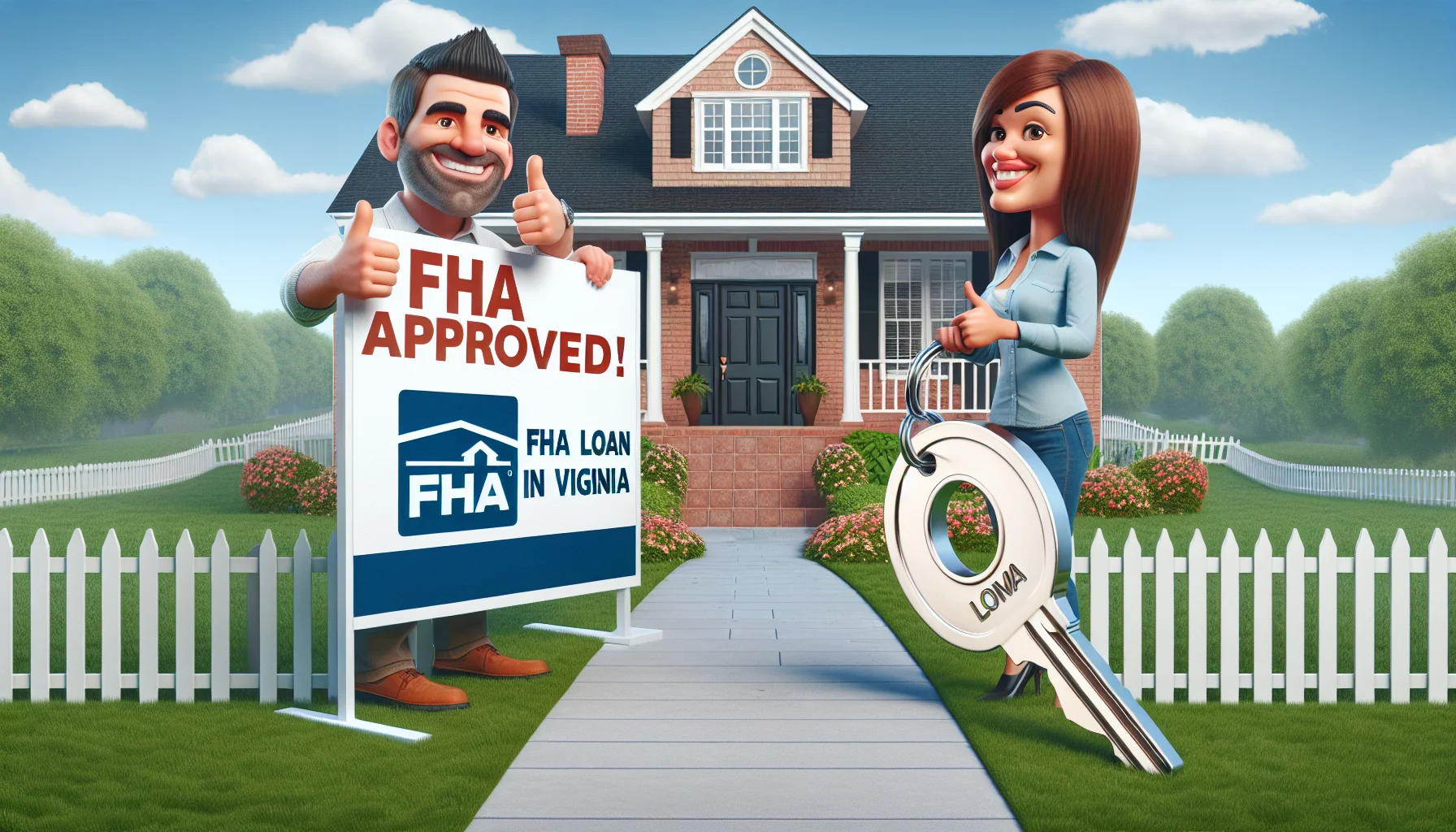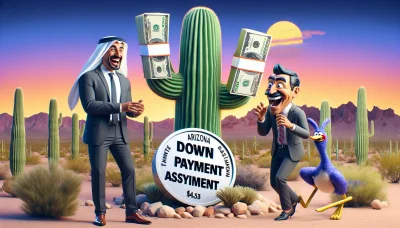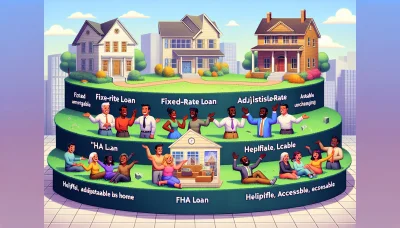Fha loans virginia Quiz
Test Your Knowledge
Question of
Understanding FHA Loans in Virginia
Eligibility Criteria for FHA Loans
Credit Score Requirements
FHA loans are a beacon of hope for individuals in Virginia with less-than-perfect credit. Typically, a credit score of 580 is the magic number to unlock the potential for a minimal 3.5% down payment. Scores between 500 and 579 aren't deal-breakers, but they do hike up the down payment requirement to 10%. It's a game-changer for those dreaming of homeownership!
Down Payment Minimums
When it comes to down payments, FHA loans stand out with their incredibly accessible terms. You can dive into homeownership in Virginia with as little as 3.5% down if your credit score is smiling at 580 or higher. Don't let a thinner wallet hold you back; this loan is designed to open doors!
Property Eligibility
Dreaming of a home in Virginia? Make sure it fits the FHA bill! The property must be your primary residence and meet HUD's safety, security, and soundness standards. An FHA-approved appraiser will be your guide, ensuring the home ticks all the right boxes before you seal the deal.
Benefits of Choosing an FHA Loan
Lower Down Payments
Virginians, listen up! An FHA loan could be your ticket to homeownership with down payments that won't break the bank. With only 3.5% down for credit scores of 580 or more, it's an opportunity you can't afford to miss! It's time to turn your home-owning dreams into reality.
More Lenient Credit Standards
Credit hiccups? No worries! FHA loans are forgiving and embrace applicants with diverse financial backgrounds. They're the perfect sidekick for Virginians who've faced financial hurdles but are ready to bounce back and step into their own homes.
Assumable Mortgage Option
Here's a Virginia-sized advantage FHA loans are assumable! That means when it's time to sell, potential buyers can take over your loan on its existing terms. In an era of climbing interest rates, this feature is like striking gold for both sellers and buyers!
The FHA Loan Application Process
Pre-approval Steps
The journey to homeownership starts with pre-approval. This crucial first step gives you a clear picture of what you can afford and shows sellers you mean business. Gather your financial info and let lenders in Virginia size up what they can offer you. Pre-approval is your golden ticket in the competitive housing market!
- Gather Financial Documents: Be prepared with tax returns, pay stubs, and bank statements.
- Credit Score Check: Know where you stand credit-wise; aim for that 580+ sweet spot.
- Lender Shopping: Don't settle on the first lender; compare rates and terms across multiple options.
- Budget Wisely: Understand your budget constraints and factor in additional costs like insurance and taxes.
- Evaluate Loan Estimates: Carefully review loan estimates for hidden fees or points that could affect long-term costs.
- Maintain Your Financial Profile: Avoid big purchases or opening new credit lines during this period.
Required Documentation
To get that FHA loan in Virginia, paperwork is king! Lenders will need proof of income, assets, debts, and employment history to give you the green light. Dotting every 'i' and crossing every 't' ensures a smoother ride towards securing your loan.
Timeline and Expectations
The road to an FHA loan approval can take anywhere from a few weeks to several months patience is key! Stay proactive by responding swiftly to lender requests and keeping tabs on your application status. Before you know it, those keys could be jingling in your pocket!
FHA Loan Limits in Virginia
Determining Loan Limits by County
Loan limits for FHA loans in Virginia vary by county and are recalibrated yearly to reflect changes in the housing market. Knowing these limits is crucial for homebuyers looking to finance their purchase with an FHA loan. The Federal Housing Administration adjusts these limits to ensure they accommodate different real estate markets across the state.
High-Cost Areas: Certain counties in Virginia are designated as high-cost areas. Places like Arlington and Fairfax fall into this category, where the cost of living and average home prices exceed national averages, prompting higher loan limits to make FHA loans accessible in these regions.
Standard Loan Limits: For the majority of counties, standard FHA loan limits apply. These are set at a baseline that is consistent with the median home price in the area, ensuring buyers have sufficient borrowing power without overextending credit facilities.
Adjustments for 2023: With each passing year, adjustments are made to reflect economic trends. For 2023, these adjustments account for rising property values, aiming to help buyers keep pace with an evolving market.
How Loan Limits Affect Buying Power
The FHA loan limits directly impact your buying power by capping the maximum amount you can borrow. It's a balancing act between what you can afford and what's available on the market within these financial constraints.
Impact on Property Choices: These limits may restrict your property choices, especially in more expensive markets where homes prices can quickly surpass FHA thresholds. As a buyer, it's essential to understand how these caps can shape your property search.
- Strategies for Staying Within Limits: To navigate these restrictions, consider properties that need a bit of TLC or look at homes slightly below your maximum budget to leave room for potential bidding wars or renovations.
- Considering Adjacent Areas for More Options: Sometimes stepping just outside a high-cost zone can significantly expand your options. Exploring neighboring counties might reveal hidden gems that align better with FHA loan limits.
Comparing FHA and Conventional Loan Limits
FHA and conventional loans differ fundamentally in their approach to loan limits. While both aim to provide lending solutions that cater to various financial situations, they operate under different sets of rules and guidelines.
Basic Differences in Loan Limits: Conventional loans often offer higher loan limits compared to FHA loans, which means they might be more suitable for those looking at pricier properties or areas with higher living costs.
Pros and Cons of Each Loan Type: FHA loans are known for their lower down payment requirements and more lenient credit qualifications, making them ideal for first-time homebuyers or those with less-than-perfect credit scores. Conversely, conventional loans can offer more flexibility but typically require stronger credit histories and larger down payments.
Making the right choice between an FHA and conventional loan hinges on your financial situation, credit score, down payment capacity, and long-term homeownership goals. Carefully weigh these factors against current loan limits to make an informed decision tailored to your needs.
Finding FHA-Approved Properties in Virginia
Types of Properties Eligible for FHA Loans
FHA loans are a gateway to homeownership for many Virginians, offering flexibility that conventional loans often lack. One vital step is understanding which types of properties qualify. Single-family homes are the most common and straightforward option, meeting the needs of a wide range of borrowers.
For those looking to invest or accommodate larger families, multi-family units can also be financed through FHA loans. This includes properties with up to four separate living spaces, making them a smart choice for both residential and investment purposes.
The hunt for an FHA-approved condominium can be more complex due to additional requirements. However, HUD-approved condos meet specific criteria that make them eligible for FHA financing, helping expand your options when looking for a new home in Virginia.
The Role of Appraisals in FHA Financing
An appraisal is not just about determining valueit's also about ensuring the property meets FHA's safety and security standards. The appraisal process starts with a licensed professional evaluating the home's market value and inspecting it for compliance with FHA property guidelines.
FHA has stringent property condition requirements; they're not just picky, they're cautious. The goal is to protect the buyer from investing in a property with significant defects or safety issues. This means everything from roofing to electrical systems must be up to par.
Dealing with appraisal issues can be daunting but don't lose hope! If an appraisal comes back with required repairs, negotiations often ensue. Sellers may agree to make fixes, or you might roll repair costs into your loansolutions exist!
Tips for Searching FHA-Approved Homes
Diving into online resources is like unlocking a treasure trove of FHA-approved listings. Websites like the HUD Home Store are packed with potential homes just waiting to be discovered by savvy house hunters like you!
Working with a real estate agent who's fluent in FHA transactions can be a game-changer. They have the know-how and tools to filter through listings and pinpoint homes that tick all the boxes of FHA approval criteria.
- Verify Eligibility: Double-check if properties are eligible for FHA financing before diving deeper.
- Use Filters: Utilize search filters on real estate websites to save time by viewing only FHA-approved homes.
- Check HUD Listings: Explore HUDs own listings regularly as their inventory updates frequently.
- Pre-Approval: Secure pre-approval for an FHA loan to streamline your house-hunting process.
- Understand Limits: Know the FHA loan limits in your area as they vary by county and property type.
- Inspect Thoroughly: Always conduct thorough inspections to avoid unforeseen property condition issues down the line.
- Maintain Flexibility: Be open to potential renovations or repairs that could make a non-compliant property eligible.
- Bid Smartly: When bidding on HUD auctions, stay within budget while considering potential repair costs.
- Persistency Pays Off: Stay persistent in your search; finding the right FHA-approved home may take time but its worth it!
If you're keen on experiencing auctions firsthand or taking part in open houses, these events can offer unique opportunities to snag an FHA-approved property at competitive prices. Keep your eyes peeledyour dream home might just be one bid away!
Navigating FHA Mortgage Insurance Premiums (MIP)
Understanding the Purpose of MIP
FHA Mortgage Insurance Premiums are a safeguard, a financial shield that protects lenders from the risk of borrower default. This essential component ensures that the lending party is covered, making loans accessible to a wider range of homebuyers. Think of MIP as your entry ticket to the homeownership world when you're working with less-than-perfect credit scores or lower down payments.
Calculating MIP costs isn't rocket science, but it's crucial! These costs depend on loan amount, term, and the down payment percentage. It's a small price to pay for the huge leap towards owning your dream home. Remember, MIP is there to make sure everyone wins borrowers get their homes, and lenders stay secure.
The duration of MIP payments can feel like a marathon, but knowing the finish line helps keep things in perspective. Typically, you're looking at 11 years for a 10% down payment or over the life of the loan if less than 10% is put down. Stay informed about your payment timeline to plan your financial future effectively!
Upfront and Annual MIP Rates
Currently, Upfront MIP rates stand tall at 1.75% of the base loan amount. This might seem daunting at first glance, but it's an investment into your future nest! This fee is usually rolled into your total loan amount, so you don't have to worry about paying it out of pocket on closing day.
Calculating Annual MIP payments is another step in mastering your mortgage game plan. These payments are determined by your loan-to-value ratio and are typically between 0.45% to 1.05% annually. By understanding these numbers, you become a savvy homeowner who knows where every penny goes.
Strategies to reduce MIP costs over time include making larger down payments or refinancing once you've built enough equity. Keep an eye on rising property values they can be your ticket out of MIP payments if they push your home equity over the threshold!
Comparing MIP with Private Mortgage Insurance (PMI)
Key differences between MIP and PMI can be deal-breakers depending on your financial situation. While both insurances serve similar purposes, MIP is government-backed and mandatory for all FHA loans regardless of down payment size. PMI, on the other hand, is private sector-based and can be waived once you reach 20% equity in your home.
A cost-benefit analysis for borrowers reveals that PMI could be more cost-effective in the long run if you can afford a higher down payment upfront. However, if putting down less than 20%, an FHA loan with MIP might be more accessible and allow you to purchase a home sooner rather than later.
- Mistake: Not considering FHA loans due to MIP They often offer easier qualification criteria compared to conventional loans.
- Mistake: Overlooking potential refinancing options Refinancing can sometimes remove or reduce insurance premiums.
- Mistake: Assuming all insurance premiums are identical Different loan types have varying rates and rules regarding mortgage insurance.
- Mistake: Forgetting to track home equity Once you hit certain milestones, you may be eligible to drop mortgage insurance.
- Mistake: Neglecting credit score improvement A better credit score can lead to lower insurance rates on refinances or new purchases.
Transitioning from MIP to PMI might not just be a change in acronyms but a strategic financial move as well! As soon as you've built up sufficient equity in your property through either payments or appreciation - explore this option! It could mean waving goodbye to those pesky insurance premiums and saying hello to extra savings each month!
Refinancing an FHA Loan in Virginia
Streamline Refinance Option
The Streamline Refinance program in Virginia is a fast track to lower rates and reduced payments for FHA loan holders. This incredible option allows for refinancing without the typical mound of paperwork. Imagine slashing through the red tape and getting straight to the savings!
With this program, theres no need for a home appraisal, which means your current home's value wont hold you back from refinancing. It's the financial makeover your mortgage needs, with minimal fuss and maximum efficiency!
Eligibility Requirements for Streamline Refinancing
To tap into the Streamline Refinance program, you must meet certain criteria. Your FHA loan should have a spotless payment history for the past six months at least. Remember, this is about making your financial journey smoother, so consistency is key!
You must also be benefiting tangibly from the refinance. Whether it's a lower interest rate or a switch from an adjustable to a fixed rate, your wallet should feel the difference.
Benefits of Streamline Refinancing
This refinancing path is like finding a shortcut on your daily commuteit saves time and money! Lower monthly payments are within reach, and you could potentially skip a payment during the transition. Its like getting an unexpected financial breather!
You'll also drop the weight of high-interest rates, as Streamline Refinancing often comes with more competitive terms. It's like giving your mortgage a much-needed diet from those extra interest pounds!
Process and Documentation Needed
Even though it's "streamlined," some paperwork is still needed. You'll gather up your recent pay stubs, two years of tax returns, and nail down your current mortgage details. But dont worry; its less paperwork than standard refinancing options.
Lenders will verify employment and check if you're living in the property as your primary residence. It's all about ensuring that youre well-positioned to make this financial leap forward.
Cash-Out Refinance Considerations
Transforming home equity into cash might sound like magic, but its all part of the Cash-Out Refinance spellbook. This move can consolidate debt or fund major expenses but tread carefullythis financial power comes with significant responsibility.
The process involves replacing your existing mortgage with a new one thats larger than what you currently owe. Yes, you get cash in hand, but rememberyour home is on the line.
Understanding Cash-Out Refinancing
Cash-Out Refinancing is not just about getting immediate cash; it's also about reshaping your mortgage landscape. You'll need to consider closing costs and ensure that this new loan doesn't stretch your finances too thin.
- Evaluate Your Needs: Only consider Cash-Out Refinancing for significant expenses or debt consolidation that can't be managed otherwise.
- Know Your Numbers: Understand how much equity you can safely borrow against without jeopardizing future financial stability.
- Mind The Rates: Ensure that refinancing offers an interest rate low enough to justify replacing your current mortgage.
- Long-Term View: Think ahead! Will this decision serve you well 5-10 years down the line?
- Budget Impact: Recalibrate your budget to accommodate potentially higher monthly payments after refinancing.
- Closing Costs Awareness: Factor in closing costs which can eat into the amount you receive from cash-out.
- Risk Management: Weigh risks such as potential foreclosure if unable to keep up with new loan terms.
- Tax Implications: Consult with a tax advisor to understand how cash-out funds may affect your taxes.
- Lender Reputation: Work with reputable lenders who offer transparent terms and conditions.
- No Rash Decisions: Avoid using cash-out funds for frivolous expenses that offer no return on investment.
How Much Equity is Needed?
Overcoming Common FHA Loan Challenges in Virginia
Addressing Credit Score Issues
In the quest for homeownership, a credit score can be a pivotal factor, especially in Virginia where FHA loans are popular. A low credit score may hinder your ability to secure an FHA loan, but fear not! There are actionable steps you can take to mitigate this issue. Understanding the minimum credit requirements and working towards exceeding them should be your first move.
If your credit score isn't quite up to par, it's time to embark on a mission of improvement. Timely bill payments and reducing outstanding debt are just the beginning. Keep your credit utilization low and avoid new credit inquiries as they can temporarily dent your score. Consistency is keyover time, these practices can lead to significant improvements in your credit standing.
Strategies to Improve Your Credit Score
The journey to a better credit score is marked by disciplined financial habits. Start by reviewing your credit report for errors and disputing any inaccuracies. Next, prioritize paying down high-interest debts while keeping older credit lines open to lengthen your credit history. Remember, small changes can lead to big results!
Exploring Alternative Credit Data
For those with sparse traditional credit data, alternative credit information might be the lifeline you need. This includes rent payment history, utility bills, and even cell phone payments. Presenting this data can paint a more comprehensive picture of your financial responsibility, potentially swaying lenders in favor of approving your FHA loan application.
Seeking Credit Counseling Services
When the path forward seems murky, professional credit counselors can shine a light on your financial situation. They offer personalized advice tailored to improving your specific circumstances and guiding you towards FHA loan eligibility. Utilizing their services could be a game-changer in securing your home loan.
Managing Debt-to-Income Ratios
Your debt-to-income (DTI) ratio is a crucial metric when applying for an FHA loan in Virginia. It compares monthly debt obligations to gross incomelenders use it to gauge financial health. The lower the DTI ratio, the better the odds of securing that dream home with an FHA loan.
Understanding Debt-to-Income Limits
FHA loans come with specific DTI limits that you must meet or beat for approvaltypically 43% or less is desirable. However, exceptions exist for ratios as high as 50% under certain conditions. Familiarize yourself with these thresholds to set realistic goals for managing your debts.
Techniques for Reducing Debt
- Prioritize High-Interest Debts: Tackle loans or credit cards with the highest interest rates first to save on interest over time.
- Snowball Method: Start by clearing smaller debts for psychological wins and then move on to larger ones.
- Consolidation: Consider consolidating multiple debts into one with a lower interest rate for easier management.
- Budget Overhaul: Examine your spending habits critically and cut non-essential expenses to free up more money for debt repayment.
- Avoid New Debt: Commit to not taking on additional borrowing until existing debts are significantly reduced or cleared.
- Negotiate With Creditors: Some creditors might be willing to negotiate terms or provide relief options during financial hardships.
- Automated Payments: Set up auto-payments wherever possible to avoid missed payments and potential late fees.
Increasing Income to Improve Ratios
Besides slashing debt, boosting income can also tilt DTI ratios in your favor. Explore opportunities for overtime at work, take on a second job, or turn hobbies into profitable ventures. Every extra dollar earned expands your borrowing capacity under FHA guidelines.
Handling Closing Costs and Fees
Closing costs and fees shouldn't derail your homeownership dreams in Virginia! Typically ranging from 2% to 6% of the purchase price, these expenses cover various services integral to finalizing the sale. Knowledge is power; understanding these costs upfront will prevent unwelcome surprises later on.
Estimating Closing Costs
Detailed estimates of closing costs should be sought early in the home-buying process. They commonly include appraisal fees, title insurance, attorney fees, and more. By getting an early estimate from lenders or using online calculators specifically for Virginia buyers, you're able to plan accordingly and avoid last-minute scrambles for funds.
Exploring Seller Concessions
Negotiation is an art form that can significantly benefit FHA borrowers when it comes to closing costs. Asking sellers for concessionsa contribution towards your closing costsis perfectly acceptable and often expected in real estate transactions. Such concessions can make a substantial difference in affordability at closing time.
Financial Assistance Programs for Buyers
Luckily for Virginians seeking FHA loans, there's a host of buyer assistance programs available! These programs may offer grants or loans that either don't require repayment or come with very favorable terms designed specifically for first-time buyers or those meeting certain income criteriamaking that leap into homeownership far less daunting!












